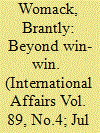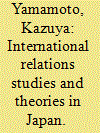| Srl | Item |
| 1 |
ID:
123985


|
|
|
|
|
| Publication |
2013.
|
| Summary/Abstract |
China is the least disadvantaged major economy in the current era of global economic uncertainty. Thus it is becoming the focus of attention of its neighbours and is achieving a prominence in the world political economy unparalleled in its modern history.
To a great extent, China's success is the result of 'good neighbour diplomacy' such as 'win-win' and the policies of reform and openness of the past thirty years. However, despite continuity in policy, China's 'peaceful leap forward' since 2008 has changed the context of its external relationships. The increasing asymmetries between China and its neighbours, as well as decreasing asymmetry with the United States, require an adjustment of win-win values beyond mutual benefit to credible reassurance.
As China's neighbours become more dependent, they also become more anxious concerning their interests. Meanwhile, China's relative gain on the US requires a different kind of confidence-building diplomacy.
|
|
|
|
|
|
|
|
|
|
|
|
|
|
|
|
| 2 |
ID:
103997


|
|
|
|
|
| Publication |
2011.
|
| Summary/Abstract |
A common view of Japan's International Relations (IR) studies in the post-World War II period is that they are characterized by pacifism and historical approaches. This paper argues that while pacifism has continued to serve as the basis of them, the approaches adopted by researchers have become increasingly diversified. Specifically, although the main issues for Japanese IR studies in the postwar period (i.e. defense strategy, world political economy, and global issues) have been consistently addressed by researchers on the basis of pacifism, the theoretical orientation of researchers has continually become stronger. Finally, this paper argues that both changing and continuous characteristics of IR studies in Japan have been supported by global developments, and concludes that this trend will continue into the near future.
|
|
|
|
|
|
|
|
|
|
|
|
|
|
|
|